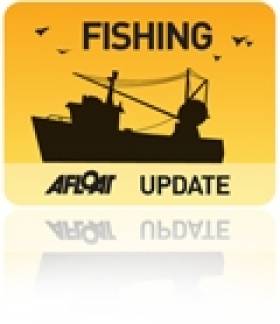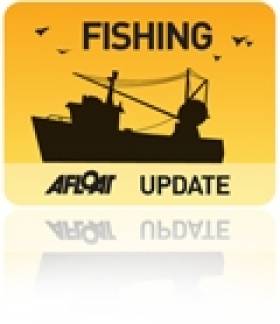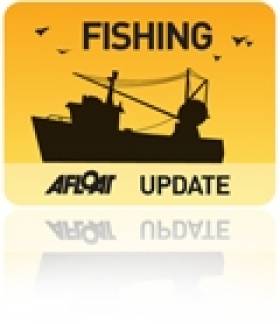Displaying items by tag: Fishing
Dundalk Sea Trout Symposium Focuses On Species Management & Conservation
#MarineScience - Inland Fisheries Ireland (IFI) and Northern Ireland’s Department of Culture, Arts and Leisure (DCAL) welcomed delegates to the second International Sea Trout Symposium, which took place this week from 20-22nd October in Dundalk.
The symposium’s key objective was to promote the wider application of an evidence-based approach to the future management and regulation of the sea trout. It also considered developments since the last symposium, held in 2004, and highlighted priorities for future investigation.
International scientists, managers and policymakers interested in the conservation and protection of the sea trout attended the conference.
Sea trout is a valuable natural resource in Ireland, offering an exceptional angling experience to both tourists and locals. Irish fisheries managers are therefore very focused on the sustainable management, and, where required, the restoration of these valuable stocks. Outputs of the symposium will be used to develop national sea trout policies.
Northern Ireland’s Minister for Culture, Arts and Leisure Carál Ní Chuilín commented: “Last year I brought in new legislation to protect both salmon and sea trout in our native rivers. All salmon and sea trout caught must be released back into the water, unless those rivers are meeting their management targets.
“We are delighted to be working with Inland Fisheries Ireland in advancing our knowledge of this species so that we all can enhance our understanding of their complex life history and ensure that we are taking all the necessary steps not only to conserve them but also to enhance stocks in our rivers.”
Meanwhile, Joe McHugh TD, Minister of State at the Department of Communications, Energy and Natural Resources, expressed his appreciation for "all the scientists, managers and fisheries stakeholders on their passion and enthusiasm in extending their knowledge and understanding of sea trout management and conservation.
"The presence of this iconic migrant, which leaves freshwater and wanders our coastal waters to feed heavily before returning to its natal streams to spawn, is considered by many as a very positive environmental indicator. I look to Inland Fisheries Ireland to ensure that sustainable management of sea trout is prioritised, and that the loss of sea trout populations, which has occurred in some areas, is halted."
Minister McHugh added: “I will work with Inland Fisheries Ireland to ensure that serious efforts are made to restore and conserve this valuable component of biodiversity in Ireland. I also applaud the North-South approach being taken in supporting science and management issues; this is required to ensure the future effective management of sea trout stocks."
Coveney Calls For Flexibility In EU Fish Quotas
#Fishing - Marine Minister Simon Coveney called for "increased flexibility" in fish quotas at the latest meeting of the EU Agriculture and Fisheries Council in Luxembourg yesterday (Thursday 22 October).
“I have called on the [European] Commission for increased flexibility in the management of certain fish quotas, which will allow member states carryover quotas to the following year," he said at the meeting of the EU's agriculture and fisheries ministers.
"I have sought flexibility specifically for mackerel, Celtic Sea herring and horse mackerel. This flexibility will to help alleviate pressure in the sector caused by the Russian ban on imports“.
Minister Coveney also used the opportunity to reinforce Ireland’s commitment to 'climate-smart' agriculture.
"It is important to encourage a coherent approach to agriculture and land use and to incorporate the critical role that afforestation and forest management plays in carbon sequestration," he said.
Ministers also had an exchange of views on the EU/Norway fisheries negotiations and discussions on the Sustainable Use of Pesticides Directive.
Budget Boost For Seafood Development Programme
#Budget2016 - The Seafood Development Programme will get a boost from next year's Budget, according to Marine Minister Simon Coveney.
Welcoming the €94 million in national co-funding under yesterday's Budget 2016 announcement, the minister says it will contribute, along with the allocation of almost €147 million for Ireland under the new European Maritime and Fisheries Fund 2014-2020, to enabling the launch of "new schemes" under the programme launched in March this year.
These will be "aimed at promoting the sustainable development of the seafood sector to 2020 and availing of the opportunities presented by the growing demand for seafood internationally."
Pending approval of the programme, Minister Coveney said he is "providing some €36 million to my department, the Marine Institute and BIM to fund the roll-out of capital investment schemes for the seafood sector under the programme.
"In 2016, this is expected to include the launch of a range of new investment schemes for the CFP discards ban, decommissioning scheme, sustainability in the inshore fisheries sector aquaculture development, seafood processing and Fisheries Local Action Groups."
The €36 million will come from the €103.8 million allocation for fisheries, fishery harbours and marine-related non-commercial State-sponsored bodies: the Marine Institute, Bord Iascaigh Mhara and the Sea-Fisheries Protection Authority.
Minister Coveney also welcomed the publication yesterday of the independent Marine Taxation Review, which recommends potential areas for support of this key sector through the taxation system.
“I look forward to further engagement with Minister Noonan on the implementation of these recommendations, particularly in relation to the proposed extension of seafarers tax allowances to the fishing industry; and the recommendation for appropriate tax treatment to support the fishing vessel decommissioning scheme.”
Search For Missing Lobsterman Off Mayo Coast
#Missing - Independent.ie reports on an ongoing search for a lobsterman feared missing off the Mayo coast since yesterday evening (Friday 11 September).
A fishing vessel was spotted on the beach at Benwee Head close to where the lone fisherman was thought to be working off Belmullet, but there was no sign of its occupant.
Searching was set to resume this morning with local lifeboats and coastguard teams includinng Shannon's Irish Coasrt Guard helicopter Rescue 115 on callout.
Sea Trout Experts To Gather In Dundalk For International Symposium Next Month
#MarineScience - The second International Sea Trout Symposium will take place in Dundalk, Co Louth from 20-22 October, as previously reported on Afloat.ie.
Building on the success of the previous symposium on the biology, conservation and management of the important fishing species, held in Cardiff in 2004, next month's convention will bring together fishery scientists, managers, policy makers and other interested parties to discuss developments over the last 11 years, identify strategic gaps in knowledge and review priorities for future investigation.
Inland Fisheries Ireland's (IFI) head of research Dr Cathal Gallagher says: “This is a great opportunity for all those interested in the ecology, management and conservation of sea trout to interact with the leading international scientists, managers and policy makers working in this area.
"It is hoped that the outputs from this important symposium will help to drive Ireland’s policy for the future management of our sea trout populations.”
Dr Ciaran Byrne, IFI chief executive, added that the symposium "gives us an important opportunity to review the progress in improving our understanding of biology, ecology, genetics and behaviour of sea trout [since Cardiff] and to identify knowledge gaps required to support the future management of this important species.”
For more information visit www.fisheriesireland.ie
Donegal Crab Boat Reports Near-Miss With Submarine
#Fishing - Donegal fishermen are counting their lucky stars after a near-miss with a submarine last week.
As TheJournal.ie reports, Seán Ó Briain says his crab boat came within just 200 metres of the sub, which appeared with little warning about 22km northwest of Tory Island last Thursday (3 September).
While the "general rule", according to Ó Briain, is to give right of way to fishing vessels such as his when setting or pulling pots, in this case "we needed to slow down to let the submarine pass".
Ó Briain added that daylight added to their luck both this time and in a similar incident this time last year, as they were able to take evasive action.
The story will bring to mind an Ardglass skipper's complaint that his prawn trawler was dragged backwards by a submarine in the Irish Sea this past April – an incident finally confirmed by the Royal Navy on Monday (7 September).
According to the Belfast Telegraph, Britain's Ministry of Defence admitted to the incident, which caused an estimated £10,000 worth of damage to Paul Murphy's boa and fishing gear, after "new information" came to light. More on the story HERE.
#scallop – The Minister for Agriculture, Food and the Marine, Simon Coveney T.D. today announced that measures to manage scallop fishing in Blacksod Bay Special Area of Conservation (SAC) had been signed into law. The measures aim to mitigate the risks, of fishing for scallop with dredges, to sensitive habitats within the Bay so as to protect and maintain these habitats.
Speaking about the Fisheries Natura Declaration for Blacksod Bay in Co. Mayo, the Minister said "Blacksod Bay contains habitats which are particularly sensitive to certain fishing activities and it is important that measures are put in place to manage the scallop fishery in this case. The quality and preservation of our marine environment is vital to the sustainability of our seafood sector and I commend the North West Regional Inshore Fisheries Forum for its work in bringing stakeholders together to address the risks posed by scallop fishing to the Blacksod Bay SAC. Stakeholder involvement is a critical success factor in developing and implementing meaningful fisheries management measures to facilitate fishing in harmony with the protection of sensitive habitats in our bays."
The Fisheries Natura Declaration gives legal effect to a risk mitigation plan prepared in partnership between the Marine Institute, the North West Regional Inshore Fisheries Forum and representatives of the fishing interests in Blacksod Bay. The measures in the Declaration include defining the footprint of the fishery to a specified zone; restricting fishing for scallops to a season from October to February inclusive and requiring fishing boats to carry GPS monitoring devices while fishing for scallop to demonstrate compliance and to contribute to data for scientific purposes. GPS monitoring devices are being funded, on a limited basis, by the Marine Institute. The Declaration and the mitigation plan will be published on www.fishingnet.ie.
The Minister re-iterated his commitment to ensuring that Irish seafood is produced in an environmentally-responsible way and stated "I have allocated almost €10 million through the Seafood Development Programme 2014-2020 to support implementation of EU environmental law, to help protect vulnerable habitats and species and ensure that our seafood sector continues to operate and grow in a sustainable manner. This investment will target a range of actions including data collection, scientific research, the use of environmentally-friendly gear and mechanisms to raise awareness of the importance of protecting the marine environment."
#Fishing - The captain of a Dutch factory ship has been found guilty by a jury at Cork Circuit Criminal Court of breaching EU sea fishery regulations, as The Irish Times reports.
Klass Dirk Meijvogel was in charge of the Wiron 5, one of two factory ships detained by the Naval Service after a routine inspection off the Blasket Islands on 12 February this year.
Sub Lt Niall McCarthy, who led the Naval boarding party on the vessel, told the court this week that he spotted an automatic grading system installed on Meijvogel's ship.
Systems of that kind allow for separating out smaller and less lucrative fish for dumping back into the sea - contravening EU rules against fish discards.
The Irish Times has much more on the story HERE.
Man Dies After Lobster Boat Incident Off Donegal
#Overboard - Breaking News reports that a man has died after falling overboard from a fishing vessel off Donegal this afternoon (Tuesday 16 June).
The deceased had been working on a lobster boat with a colleague off Horn Head when the incident occurred.
First on scene in the search and rescue operation was the Mulroy unit of the Irish Coast Guard, who recovered him from the water
He was then transferred to the Rescue 118 helicopter for airlift to Letterkenny General but was pronounced dead after arrival.
New Rules For Fish Quotas & Ending Discards Must Be Introduced On Staged Basis Says Minister
#Fishing - Marine Minister Simon Coveney has outlined the major issues of importance for Ireland in the preparation for setting quotas for 2016 following the EU Commission presentation to Council of a policy document on its intended approach to setting fish quotas in 2016.
The Council of Ministers also agreed its position on the proposed regulations for the production and labelling of organic products at today's EU Agriculture and Fisheries Council meeting (Tuesday 16 June). The next step is to secure the agreement of the European Parliament to these proposals.
Speaking earlier today, Minister Coveney welcomed the fact that the state of fish stocks generally is improving and reiterated his commitment that all fish stocks should reach the target of maximum sustainable yield (MSY) by 2020.
He pointed out that “building fish stocks to maximum sustainable yield levels will benefit both the fishing industry and the environment and help secure the future.
"The fishing industry is facing into a period of change with the new policies agreed under the reformed CFP in 2013 now being implemented. The setting of fish quotas in line with new scientific rules is being rolled out and the discards ban for whitefish stocks will commence on 1 January 2016.
"I am working to deliver these new policies on a rational and progressive basis over the next four years so that we deliver fully on the commitment for a new fully sustainable fishing industry by 2020."
The minister added: “We must not apply these new policies as a 'big bang' in 2016. What I am seeking from the EU Commission is a step by step approach which will give industry time to adjust to the new approach.
"If we look to 2020 and beyond I am confident that we will have moved the industry to a much stronger situation with fish stocks rebuilt and the unacceptable practices of discarding fish at sea ended. I made clear to the Commission that 2016 should be an important step on the path and TACs must be set on this stepwise basis, incrementally applying the new scientific rules by setting TACs so as to reach maximum sustainable yields by 2020.”
A discards plan for whitefish stocks in the waters around Ireland has been agreed by EU member states following intensive negotiations chaired by Ireland. The plan, which was developed in consultation with stakeholders, involves the phasing in of the discards ban over the 2016 to 2019 period.
“The first phase of the implementation of the discards ban which comes into effect on 1 January 2016 will require adjustment and changed practices by the fishing industry," said Minister Coveney. "To support operators, the Department [of Marine] and marine agencies will work with them in finding practical approaches to adjust to this new policy and I am making funding available to help them meet the new challenges.”
Referring to the agreement reached on proposed regulations for the organic sector, the minister said he is "delighted we have reached agreement in Council on the regulations for the production and labelling of organic produce.
"This is particularly important for Ireland in light of the numbers who have applied for the Organic Farming Scheme under our Rural Development Programme announced earlier today by my colleague Minister of State Tom Hayes. These regulations provide clear rules for the organic sector and a good basis for negotiations with the European Parliament.”
































































